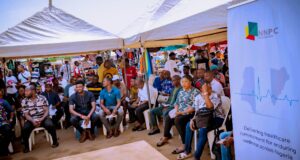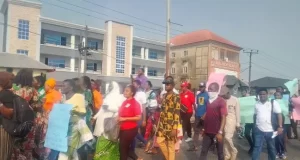The Department of Petroleum Resources (DPR) has outlined five critical levers for gas development as Nigeria moves to leverage its abundant gas resources for national growth, diversification of the
economy and to use gas as the fuel for economic transformation.
Engr. Sarki Auwalu, Director, DPR, made this known while speaking at the Pre- Summit Conference of the Nigerian International Petroleum Summit (NIPS) on the principal theme: ‘The Decade of Gas – Towards a Gas-Powered Economy’ on Monday in Abuja.
Auwalu said the levers :
availability, accessibility, affordability, and acceptability as well as
deliverability were critical to utilising Nigeria’s proven gas reserves of 203 TCF for national development.
He said: “Whereas references have been made to the other elements in this
discussion, right pricing of gas is requiring particular attention to ensure security of gas
supply and security of credible gas demand.
“This is because upstream gas producers must be assured that they will receive fair and equitable returns for their investments whereas, the price must be such that the end-users are able to pay for gas offtake in a reliable and consistent manner.
“Accordingly, the most robust and sustainable pricing mechanism is that which ‘let the market speak’ in a way that all costs are reflective of prevailing market conditions and for which the economic dynamics of demand and
supply are allowed to interplay in an open, transparent, and free market environment.
“Thus, our drive as a nation should be early attainment to the Willing Buyer; Willing Seller market status. Any transitional pricing arrangements, today, must be structured to
quickly give way for market-led pricing regime and conditions”
The DPR boss commended President Muhammadu Buhari and the Minister of State for Petroleum Resources, Chief Timipre Sylva, for their outstanding leadership in deepening gas utilisation in Nigeria.
He said these efforts had culminated in the establishment of the National Gas Expansion Programme, National Gas Transportation Network Code and the National Gas Flare Commercialisation Programme.
Auwalu said it also include the ongoing construction of the ELPS-II, OB3 and AKK pipelines as critical backbone gas infrastructure required to improve gas deliverability and availability.
He said the government was also working towards the expeditious
passage of the Petroleum Industry Bill (PIB) which would enhance clarity in legislative, regulatory , fiscal, and administrative frameworks in the industry.
“This bill, when passed
into law, will eliminate the uncertainties and bottlenecks associated with gas
development in Nigeria and accelerate the growth of the Nigerian gas market to a fully developed and matured status.
“Specifically, on gas matters, the PIB provides for the following: promotion of dedicated gas exploration and development, gas terms, fiscal separation of gas as a commodity.
“It will also enhance the domestic gas delivery obligation, tariffing structure & methodology, open access regimes and revised gas pricing framework, to mention but a few,” he added.
Auwalu said the DPR would continue to be an enabler and an opportunity provider in the Oil and Gas
Industry.
He said: “Our focus remains the effective implementation of all policies and strategic programmes of government in an efficient manner that optimises the value of our petroleum resources for all stakeholders, all in overriding national interest.”
 Financial Energy Review
Financial Energy Review





